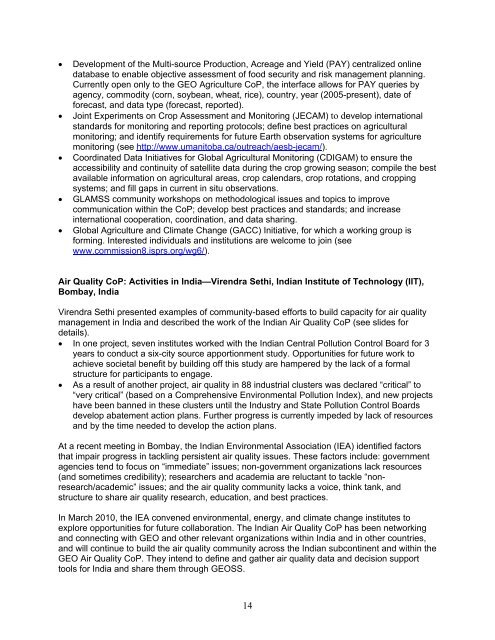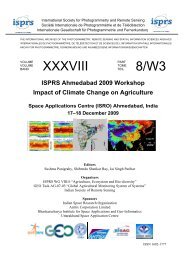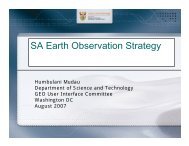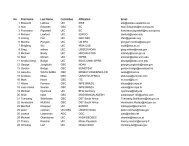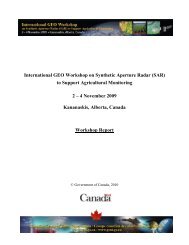GEO UIC Committee: - Group on Earth Observations
GEO UIC Committee: - Group on Earth Observations
GEO UIC Committee: - Group on Earth Observations
You also want an ePaper? Increase the reach of your titles
YUMPU automatically turns print PDFs into web optimized ePapers that Google loves.
• Development of the Multi-source Producti<strong>on</strong>, Acreage and Yield (PAY) centralized <strong>on</strong>line<br />
database to enable objective assessment of food security and risk management planning.<br />
Currently open <strong>on</strong>ly to the <str<strong>on</strong>g>GEO</str<strong>on</strong>g> Agriculture CoP, the interface allows for PAY queries by<br />
agency, commodity (corn, soybean, wheat, rice), country, year (2005-present), date of<br />
forecast, and data type (forecast, reported).<br />
• Joint Experiments <strong>on</strong> Crop Assessment and M<strong>on</strong>itoring (JECAM) to develop internati<strong>on</strong>al<br />
standards for m<strong>on</strong>itoring and reporting protocols; define best practices <strong>on</strong> agricultural<br />
m<strong>on</strong>itoring; and identify requirements for future <strong>Earth</strong> observati<strong>on</strong> systems for agriculture<br />
m<strong>on</strong>itoring (see http://www.umanitoba.ca/outreach/aesb-jecam/).<br />
• Coordinated Data Initiatives for Global Agricultural M<strong>on</strong>itoring (CDIGAM) to ensure the<br />
accessibility and c<strong>on</strong>tinuity of satellite data during the crop growing seas<strong>on</strong>; compile the best<br />
available informati<strong>on</strong> <strong>on</strong> agricultural areas, crop calendars, crop rotati<strong>on</strong>s, and cropping<br />
systems; and fill gaps in current in situ observati<strong>on</strong>s.<br />
• GLAMSS community workshops <strong>on</strong> methodological issues and topics to improve<br />
communicati<strong>on</strong> within the CoP; develop best practices and standards; and increase<br />
internati<strong>on</strong>al cooperati<strong>on</strong>, coordinati<strong>on</strong>, and data sharing.<br />
• Global Agriculture and Climate Change (GACC) Initiative, for which a working group is<br />
forming. Interested individuals and instituti<strong>on</strong>s are welcome to join (see<br />
www.commissi<strong>on</strong>8.isprs.org/wg6/).<br />
Air Quality CoP: Activities in India—Virendra Sethi, Indian Institute of Technology (IIT),<br />
Bombay, India<br />
Virendra Sethi presented examples of community-based efforts to build capacity for air quality<br />
management in India and described the work of the Indian Air Quality CoP (see slides for<br />
details).<br />
• In <strong>on</strong>e project, seven institutes worked with the Indian Central Polluti<strong>on</strong> C<strong>on</strong>trol Board for 3<br />
years to c<strong>on</strong>duct a six-city source apporti<strong>on</strong>ment study. Opportunities for future work to<br />
achieve societal benefit by building off this study are hampered by the lack of a formal<br />
structure for participants to engage.<br />
• As a result of another project, air quality in 88 industrial clusters was declared “critical” to<br />
“very critical” (based <strong>on</strong> a Comprehensive Envir<strong>on</strong>mental Polluti<strong>on</strong> Index), and new projects<br />
have been banned in these clusters until the Industry and State Polluti<strong>on</strong> C<strong>on</strong>trol Boards<br />
develop abatement acti<strong>on</strong> plans. Further progress is currently impeded by lack of resources<br />
and by the time needed to develop the acti<strong>on</strong> plans.<br />
At a recent meeting in Bombay, the Indian Envir<strong>on</strong>mental Associati<strong>on</strong> (IEA) identified factors<br />
that impair progress in tackling persistent air quality issues. These factors include: government<br />
agencies tend to focus <strong>on</strong> “immediate” issues; n<strong>on</strong>-government organizati<strong>on</strong>s lack resources<br />
(and sometimes credibility); researchers and academia are reluctant to tackle “n<strong>on</strong>research/academic”<br />
issues; and the air quality community lacks a voice, think tank, and<br />
structure to share air quality research, educati<strong>on</strong>, and best practices.<br />
In March 2010, the IEA c<strong>on</strong>vened envir<strong>on</strong>mental, energy, and climate change institutes to<br />
explore opportunities for future collaborati<strong>on</strong>. The Indian Air Quality CoP has been networking<br />
and c<strong>on</strong>necting with <str<strong>on</strong>g>GEO</str<strong>on</strong>g> and other relevant organizati<strong>on</strong>s within India and in other countries,<br />
and will c<strong>on</strong>tinue to build the air quality community across the Indian subc<strong>on</strong>tinent and within the<br />
<str<strong>on</strong>g>GEO</str<strong>on</strong>g> Air Quality CoP. They intend to define and gather air quality data and decisi<strong>on</strong> support<br />
tools for India and share them through <str<strong>on</strong>g>GEO</str<strong>on</strong>g>SS.<br />
14


